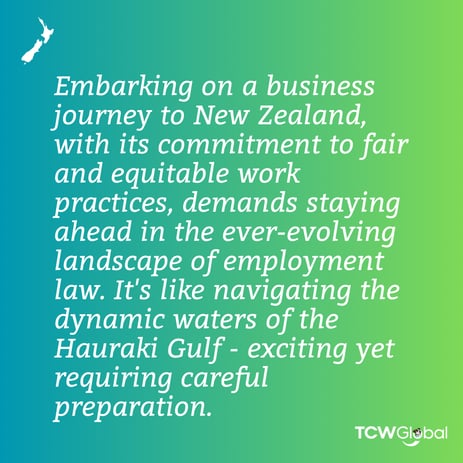From 2023's Groundbreaking Shifts to 2024's Predicted Changes: A Comprehensive Guide for Businesses Eyeing New Zealand

December 8, 2023

From 2023's Groundbreaking Shifts to 2024's Predicted Changes: A Comprehensive Guide for Businesses Eyeing New Zealand
Kia ora! If you're a savvy business keen on heading to New Zealand, you'll need more than just a good pair of gumboots. Staying clued up on our latest employment laws is as essential as knowing your flat whites from your long blacks. It's crucial to stay informed about the latest employment laws in the country. Here’s a detailed overview of the significant changes in New Zealand's employment laws in 2023 and what's on the horizon for 2024.
2023 Employment Law Changes
Worker Protection (Migrant and Other Workers) Bill
Effective January 6, 2024 this legislation amends several key Acts - the Immigration Act 2009, the Employment Relations Act 2000, and the Companies Act 1993 - to introduce a specific offense and penalty regime. This is aimed at deterring businesses from exploiting temporary migrant workers and minimizing compliance risks with their obligations.
The need for this bill arises from various forms of exploitation faced by migrant workers, ranging from non-compliance with employer obligations to more severe issues like forced labor and human trafficking. Under the new law, businesses are required to comply with requests from the Labour Inspectorate within 10 working days, including providing employment-related documents. Failure to comply introduces a new infringement offense.
Furthermore, the High Court will have the authority to disqualify individuals from being directors of New Zealand companies if convicted of exploiting unlawful workers and temporary workers or trafficking in persons.
Increase in Parental Leave Payments
The increase in parental leave payments in New Zealand, effective from July 1, 2023, was announced by the Associate Minister for Workplace Relations and Safety. This adjustment, which saw a 7.7% increase, aligns with the rise in the average weekly earnings. The new policy raises the maximum weekly rate for eligible workers from $661.12 to $712.17 gross per week.
This amendment to the Parental Leave and Employment Protection Act 1987 is believed to be important as it helps ensure that parental leave payments keep pace with the cost of living and wage growth, thereby supporting parents in maintaining financial stability during their leave.
Extended Time for Sexual Harassment Grievances
The "Employment Relations (Extended Time for Personal Grievance for Sexual Harassment) Amendment Act" in New Zealand, effective from June 13, 2023, significantly extends the time frame for workers to raise a personal grievance related to sexual harassment from 90 days to 12 months. All existing employment agreements signed prior to the Act will be covered by the modified time. This legislative change was viewed as crucial because it acknowledges the challenges often faced by victims of sexual harassment in the workplace. Reporting such incidents can be a complex and emotionally taxing process, and victims may need considerable time before feeling ready to come forward.
By extending the reporting time limits, the amendment aims to provide a more supportive and accessible framework for victims to report sexual harassment, ensuring they have adequate time to process the incident and decide on the best course of action. This change applies even if the worker leaves the employment during the 12-month period.
Fair Pay Agreements Regulations
The Fair Pay Agreements (FPA) regulations in New Zealand provides a system for unions and businesses associations to negotiate employment terms for all covered workers in an industry or occupation. In May 2023, New Zealand Legislation published the second package of Fair Pay Agreements Regulations incorporating mandatory content in Agreements and resulted in amendments to regulations under the for Fair Pay Agreements Regulations 2022, Employment Relations Authority Regulations 2000, and Employment Court Regulations 2000.

Predictions for 2024
- Holidays Act Reform: This major reform aims to clarify the Holidays Act, providing clear methods, formulas, and tests for employers calculating leave entitlements and increased access to some leave entitlements for workers while also addressing ambiguities in the existing legislation.
Final Thoughts
Embarking on a business journey to New Zealand, with its commitment to fair and equitable work practices, demands staying ahead in the ever-evolving landscape of employment law. It's like navigating the dynamic waters of the Hauraki Gulf - exciting yet requiring careful preparation. TCWGlobal can be your compass in this endeavor, offering expertise and tailored solutions—partner with us for a seamless transition and prosperous operations in this market. Explore more at TCWGlobal.com to anchor your business firmly in Kiwi-land.
